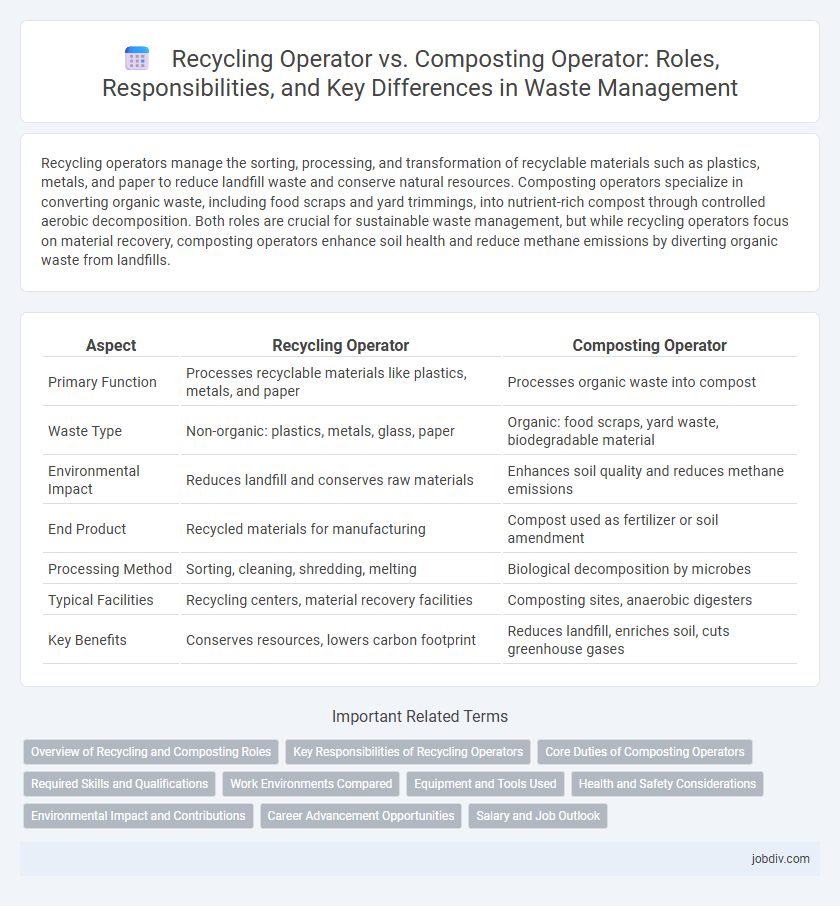Recycling operators manage the sorting, processing, and transformation of recyclable materials such as plastics, metals, and paper to reduce landfill waste and conserve natural resources. Composting operators specialize in converting organic waste, including food scraps and yard trimmings, into nutrient-rich compost through controlled aerobic decomposition. Both roles are crucial for sustainable waste management, but while recycling operators focus on material recovery, composting operators enhance soil health and reduce methane emissions by diverting organic waste from landfills.
Table of Comparison
| Aspect | Recycling Operator | Composting Operator |
|---|---|---|
| Primary Function | Processes recyclable materials like plastics, metals, and paper | Processes organic waste into compost |
| Waste Type | Non-organic: plastics, metals, glass, paper | Organic: food scraps, yard waste, biodegradable material |
| Environmental Impact | Reduces landfill and conserves raw materials | Enhances soil quality and reduces methane emissions |
| End Product | Recycled materials for manufacturing | Compost used as fertilizer or soil amendment |
| Processing Method | Sorting, cleaning, shredding, melting | Biological decomposition by microbes |
| Typical Facilities | Recycling centers, material recovery facilities | Composting sites, anaerobic digesters |
| Key Benefits | Conserves resources, lowers carbon footprint | Reduces landfill, enriches soil, cuts greenhouse gases |
Overview of Recycling and Composting Roles
Recycling operators manage the collection, sorting, and processing of recyclable materials such as plastics, metals, and paper to reduce landfill waste and promote material reuse. Composting operators handle organic waste, transforming food scraps, yard waste, and other biodegradable materials into nutrient-rich compost for soil enrichment. Both roles contribute to waste diversion but focus on different material streams and processes for sustainable waste management.
Key Responsibilities of Recycling Operators
Recycling operators are responsible for sorting, processing, and managing recyclable materials such as paper, plastic, metal, and glass to divert waste from landfills and support sustainable resource use. They operate machinery to separate contaminants, monitor quality control, and ensure compliance with environmental regulations. Their role is essential in minimizing environmental impact by enhancing recycling efficiency and promoting circular economy practices.
Core Duties of Composting Operators
Composting operators primarily manage organic waste decomposition by overseeing the aerobic breakdown of biodegradable materials into nutrient-rich compost, promoting soil health and reducing landfill reliance. Their duties include monitoring moisture, temperature, and aeration levels to optimize microbial activity and ensure effective compost maturation. These operators also handle quality control, pathogen reduction, and proper curing to produce safe, high-quality compost for agricultural and landscaping use.
Required Skills and Qualifications
Recycling Operators require knowledge in sorting techniques, safety protocols, and operation of recycling machinery, often needing a high school diploma and vocational training in waste management. Composting Operators must understand organic waste decomposition, microbial processes, and environmental regulations, typically requiring certification in composting or environmental science. Both roles demand physical stamina, attention to detail, and adherence to health and safety standards in waste handling.
Work Environments Compared
Recycling operators typically work in facilities focused on sorting, processing, and distributing recyclable materials, often involving conveyor belts, machinery, and exposure to dust or noise. Composting operators manage organic waste breakdown in outdoor or semi-enclosed environments where temperature control, odor, and microbial activity are significant factors. Both roles require adherence to safety protocols, but recycling operations emphasize mechanical handling while composting focuses on biological processes.
Equipment and Tools Used
Recycling operators primarily utilize machinery such as balers, shredders, conveyors, and optical sorters to separate and process materials like plastics, metals, and paper. Composting operators rely on equipment like windrow turners, aerators, screens, and grinders to manage organic waste and facilitate decomposition. Both operators need specialized tools tailored to their specific waste streams, ensuring efficient handling and processing.
Health and Safety Considerations
Recycling operators face specific health risks such as exposure to sharp objects, chemical contaminants, and airborne particles, requiring strict use of personal protective equipment (PPE) and rigorous machinery safety protocols. Composting operators encounter biohazards including mold spores, bacteria, and gases like ammonia, necessitating effective ventilation systems and regular health monitoring to prevent respiratory issues. Both roles demand comprehensive training in hazardous material handling and emergency response to ensure worker safety in waste management environments.
Environmental Impact and Contributions
Recycling operators significantly reduce landfill waste by processing materials like plastics, metals, and paper, thus conserving natural resources and lowering greenhouse gas emissions. Composting operators contribute by converting organic waste into nutrient-rich soil amendments, enhancing soil health and reducing methane emissions from organic waste decomposition in landfills. Both play crucial roles in sustainable waste management, but composting directly improves soil ecosystems while recycling primarily conserves raw materials and energy.
Career Advancement Opportunities
Recycling operators often benefit from diverse certification programs and industry partnerships that enhance their skills in material recovery and processing technologies, leading to roles in management or environmental consulting. Composting operators gain specialized expertise in organic waste management and soil health, with career paths advancing toward sustainability coordination or agribusiness innovation. Both fields offer substantial growth potential, but career advancement in recycling tends to be broader due to its applicability across multiple waste streams and evolving circular economy initiatives.
Salary and Job Outlook
Recycling operators typically earn an average salary between $30,000 and $45,000 annually, with job growth projected at 4% over the next decade due to increased recycling initiatives. Composting operators, earning slightly less, average around $28,000 to $40,000 per year, but the demand for organic waste processing jobs is expected to grow at 6%, driven by rising interest in sustainable agriculture and waste reduction. Both roles offer stable employment opportunities, yet composting operators may experience faster job growth because of expanding environmental regulations and community composting programs.
Recycling Operator vs Composting Operator Infographic

 jobdiv.com
jobdiv.com